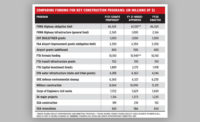
Transit agencies found much to smile about in President Obama's fiscal year 2015 budget proposal, which seeks to boost the Federal Transit Administration's total budget by 63%, to $17.6 billion. "This is a terrific proposal for public transportation," says Rob Healy, American Public Transportation Association (APTA) vice president for government affairs.
For design and construction firms, a particular focus is the $2.5 billion Obama is seeking—up 29% from 2014—for FTA capital investment grants, which fund new starts. But the request faces high hurdles on Capitol Hill. It first will be scrutinized by congressional appropriators, who have less than 1% more in total non-defense discretionary funds available in 2015 than they had in 2014.
Moreover, the Obama plan's 2015 transit hike and its 19% increase for highways hinge on its proposed $150-billion addition to the Highway Trust Fund. To do so, Obama proposes a corporate-tax change. That item is a key element of his envisioned $302-billion four-year transportation bill (ENR 3/10/14 p. 8).
DOT Secretary Anthony Foxx told an APTA conference on March 10 that the funding quest will be tough, but he sees positive signs, such as House Ways and Means Committee Chairman Dave Camp's recent tax-reform plan. Like Obama's plan, Camp's includes a corporate-tax source for a trust-fund booster shot. But major tax legislation faces long odds in Congress in an election year.
Foxx says Congress "understands that we're at a crisis point" in transportation, but adds, "I don't know that there is a 50-plus-1 [majority] solution, particularly on the House side, to be honest with you."
Obama's $2.5-billion FY15 transit capital grant request includes $1.4 billion in further installments for 12 projects under way that have FTA full-funding agreements. Another $578 million would go to seven projects that don't yet have FTA agreements.
"We're strongly urging Congress to fully fund our $2.5-billion request," FTA Deputy Administrator Therese McMillan said on March 5. If Congress clears less than that sum, "we will then have to decide which projects are most ready to proceed," she says. "We would first want to deal with payments to projects that already have committed funding."
A cut may force some new starts to wait. But McMillan says, "Worthy projects just don't fall off a cliff and disappear. It's just a matter of how soon we can get to them in the pipeline based on the appropriated funding."




Post a comment to this article
Report Abusive Comment